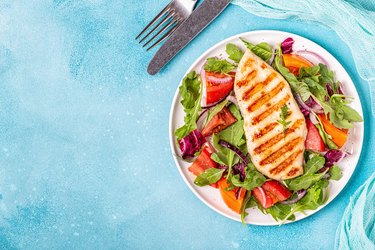
If you want a crispy-skinned chicken with perfect grill lines, the truth is, you're not going to get that in the microwave oven. But if you want to poach chicken in the microwave or want to quickly microwave chicken thighs to get them on the table faster, it is possible to do.
Keep in mind though, that because chicken is fairly lean, it can dry out quickly. The key to a pulling off a microwave chicken breast recipe is to decrease the microwave's power and cover the chicken to avoid losing moisture. That being said, cooking a chicken in the microwave won't give you the same results as throwing the chicken on the grill, no matter what you do.
Video of the Day
Video of the Day
Poach Chicken in the Microwave
Although you can't technically grill chicken in a microwave oven, you can poach it. To do so, season chicken to your tastes and then arrange chicken breasts or chicken thighs in a single layer in a microwave-safe glass pie plate. If you're cooking more than two chicken breasts, you may have to do this in batches.
Once the chicken breast is arranged in the plate, add 2 tablespoons of chicken broth or water to the bottom of the pie plate and cover with plastic wrap. Poke a couple holes in the plastic wrap to allow steam to vent and then microwave on medium power for about 15 minutes or until juices run clear.
The U.S. Department of Health & Human Services notes that the internal temperature of the cooked chicken should reach 165 degrees Fahrenheit before you can safely eat it.
Keep in mind that microwave ovens are notorious for uneven cooking, so check several areas of the chicken breasts or thighs with a meat thermometer before determining whether or not the chicken is safely cooked. Once the chicken is cooked, remove it from the microwave oven and allow to sit for five minutes before serving.
Read more: How to Bake a Plain Chicken Breast
Microwaves and Nutrition
The microwave may be your cooking method of choice for convenience, but you may also have questions about whether it's an acceptable method of cooking when it comes to nutrition. If so, you might be surprised to hear what Anthony L. Komaroff, MD, a professor of medicine at Harvard Medical School and a senior physician at Brigham and Women's Hospital in Boston, had to say in a Harvard Health Publishing post updated in February 2019.
According to Dr. Komaroff, microwaving may actually help retain nutrients in food better than other methods of cooking, like roasting or boiling. That's because nutrients, like vitamin C, are sensitive to heat and the longer the food cooks, the more the nutrients break down. Since microwaves take a significantly shorter time to cook food, the nutrients aren't destroyed as much.
Read more: Disadvantages With Cooking in the Microwave
But, as with any cooking method, there are some things to keep in mind when using the microwave. Harvard Health Publishing shares these tips that can help keep your food safe and free from contaminants:
- Make sure you're using microwave-safe containers when cooking in the microwave.
- Avoid old, scratched or cracked containers or those that have already been used in the microwave a lot. They may leak out more contaminants and plasticizers that can get into your food.
- Don't let plastic wrap touch your food during microwave cooking. If you can't prevent the plastic from touching, opt for parchment paper or wax paper instead.
- Never fully cover a dish when microwaving it. Make sure there's a vent or hole so steam can properly escape.
- Oxidative Medicine and Cellular Longevity: "Oxidative Stress: Harms and Benefits for Human Health"
- U.S. Department of Health and Human Services: "Safe Minimum Cooking Temperatures Charts"
- USDA Food Safety and Inspection Service: "Microwave Ovens and Food Safety"
- Harvard Health Publishing: "Microwaving Food in Plastic: Dangerous or Not?"
- Harvard Health Publishing: "Ask the Doctor: Microwave's Impact on Food"